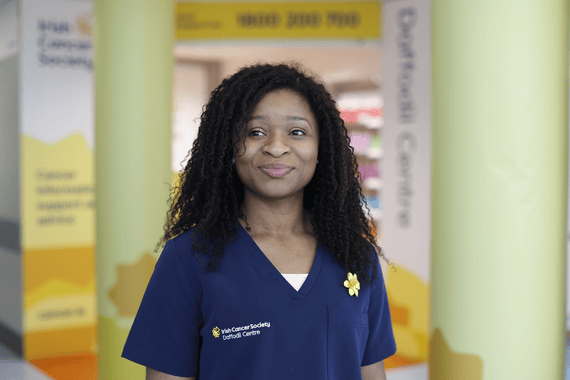Vulval cancer
Diagnosis and tests
Diagnosing vulval cancer
Your family doctor (GP) will talk to you about your symptoms. Your GP will refer you to hospital if they think you need more tests.
Tests you might have include:
This is a physical exam of your vagina. Your doctor might also do an internal vaginal exam by putting a gloved finger into your vagina to check for any abnormal changes.
Your doctor can take small amounts of tissue samples from your vulva. These are called biopsies. The vulval biopsy is usually carried out with a local anaesthetic. Biopsies are sent to a laboratory and looked at under a microscope to find out if cancer cells are present.
A gynaecologist is a doctor who specialises in treating problems with the female reproductive system, e.g. vagina, vulva, womb (uterus) and ovaries.

If you are diagnosed with vulval cancer, we're here for you.
Our cancer nurses are here if you need information or just want to talk. They can help you to understand your diagnosis and what to expect, send you information and tell you about our services.
Further tests for vulval cancer
You may need further tests to give your doctors more information about your general health and about the cancer. For example:
A special type of X-ray to give a picture of the tissues inside your body
Read more about CT scans.
This is a scan that uses magnetic energy to build up a picture of the tissues inside your body. During the scan you will lie inside a tunnel-like machine.
Read more about MRI scans.
Using a radioactive injection that will show up any cancer spread to other parts of your body on a scan picture.
Read more about PET scans.
A colposcopy is a test where a camera is used to look at your cervical area.
Read more about having a colposcopy.
A small tube with a light passed into your bladder to look at the bladder lining, usually under general anaesthetic. This is because sometimes vulval cancer can spread into the bladder.
Read more about having a cystoscopy.
The tests you have can help to:
- Stage your cancer. This means finding out the size and position of the cancer.
- Grade your cancer. Grading describes how quickly the cancer may grow and spread and how it might respond to treatment.
Some tests may be used see how you are responding to treatment.
Waiting for test results
While some results may come back quickly, others may take a few weeks. Waiting for results can be an anxious time. It may help to talk things over with your doctor or nurse or with a relative or close friend. You can also call our Support Line on 1800 200 700 or visit a Daffodil Centre to speak to a cancer nurse.
What are the stages of vulval cancer?
Staging means finding out how big the cancer is and if it has spread to other parts of your body. Staging, along with grading, will help your doctor to plan the best treatment for you.
Some doctors will also use the TNM staging which stands for:
- Tumour (T): How big the tumour is in the vulva
- Node (N): The amount of cancer in the lymph nodes surrounding the vulva, if any
- Metastasis (M): If the cancer spread to other parts of the body
Number staging
The staging used in vulval cancer is usually the FIGO staging which stands for International Federation of Gynaecology and Obstetrics. It has 4 main stages.
Stage 1
The cancer is only in your vulva or perineum.
Stage 1b
The cancer is still in the vulva or perineum but is slightly larger in size.
Stage 2
The cancer has spread into the nearby tissues such as the vagina or anus.
Stage 3
The cancer has spread from the vulva into the lymph nodes near the vulva.
Stage 4
The cancer has spread to nearby or distant organs.
Knowing the stage and grade of your cancer helps your team to plan the best treatment for you.
What are the grades of vulval cancer?
Grading describes how quickly the cancer may grow and spread.
Low-grade vulval cancer
The cancer cells look only slightly abnormal, much like normal vulval cells. The cancer is usually slow-growing and less likely to spread than high-grade vulval cancer. This type is also known as well differentiated vulva cancer.
High-grade vulval cancer
The cancer cells look fairly or very abnormal and are more likely to grow quickly. This type is also known as poorly differentiated vulva cancer.
Staging and grading can be hard to understand, so ask your doctor and nurse for more information if you need it.
Continue reading about vulval cancer




Get help & support

Support Line
Free support pack

